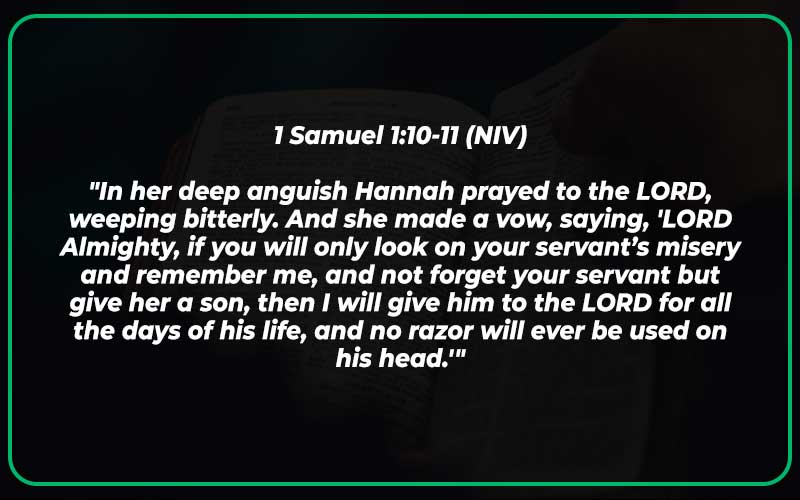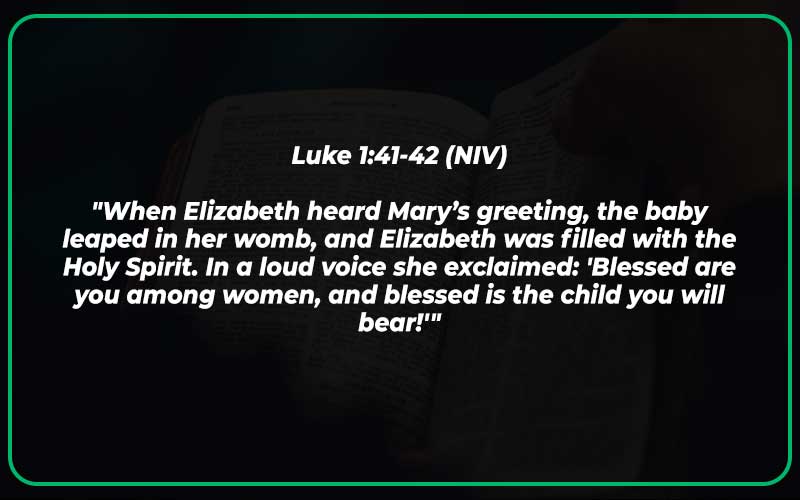It is no secret that bearing and raising children is a monumental task. Despite the magnitude of its challenge, embracing the experience of bearing and raising children is a hallmark of faith and brings countless rewards.
For many, reading Bible verses about bearing children provides valuable comfort and inspiration. In this blog post, we will explore remarkable scriptures that provide insight into the wonders and wonderfulness of having children.
Also Read: Best 20 Bible Verses About Anxiety And Depression (With Commentary)
Bible Verses about Bearing Children
Genesis 1:28 (NIV)
“God blessed them and said to them, ‘Be fruitful and increase in number; fill the earth and subdue it. Rule over the fish in the sea and the birds in the sky and over every living creature that moves on the ground.'”
This verse is God’s original command and blessing to humanity. God establishes the foundational role of procreation in human life. In His divine design, He encourages growth and multiplication, emphasizing the importance and sanctity of human life.
Genesis 30:1 (NIV)
“When Rachel saw that she was not bearing Jacob any children, she became jealous of her sister. So she said to Jacob, ‘Give me children, or I’ll die!'”
This verse illustrates the deep longing for children in Biblical times. Rachel’s desperation underscores the significance of motherhood, showcasing the emotional depth and impact of child-bearing.
Psalm 127:3 (NIV)
“Children are a heritage from the LORD, offspring a reward from him.”
In this Psalm, children are portrayed as God’s blessings. The verse is a reminder that every child is a divine gift, encouraging gratitude and reverence for the miracle of life.
Genesis 25:21 (NIV)
“Isaac prayed to the LORD on behalf of his wife, because she was childless. The LORD answered his prayer, and his wife Rebekah became pregnant.”
This passage shows prayer as a powerful tool in seeking children. Isaac’s answered prayer showcases God’s compassion, reinforcing the concept that children are a blessing bestowed by Him.
Luke 1:13 (NIV)
“But the angel said to him: ‘Do not be afraid, Zechariah; your prayer has been heard. Your wife Elizabeth will bear you a son, and you are to call him John.'”
In this verse, Zechariah is informed of the impending birth of John the Baptist. This highlights that every child has a purpose and destiny, and it reinforces the idea of divine intervention and planning in the birth of a child.
1 Samuel 1:10-11 (NIV)
“In her deep anguish Hannah prayed to the LORD, weeping bitterly. And she made a vow, saying, ‘LORD Almighty, if you will only look on your servant’s misery and remember me, and not forget your servant but give her a son, then I will give him to the LORD for all the days of his life, and no razor will ever be used on his head.'”
This verse presents a sincere prayer from Hannah, a woman desperate for a child. Her vow demonstrates the level of her commitment, reinforcing the idea of children as blessings, and the lifelong responsibilities and commitments of parenthood.

Genesis 21:1-2 (NIV)
“Now the LORD was gracious to Sarah as he had said, and the LORD did for Sarah what he had promised. Sarah became pregnant and bore a son to Abraham in his old age, at the very time God had promised him.”
This verse reassures us of God’s faithfulness to His promises. Despite Abraham and Sarah’s old age, God enabled Sarah to conceive, reinforcing the belief in divine providence and miraculous interventions.
Luke 1:30-31 (NIV)
“But the angel said to her, ‘Do not be afraid, Mary; you have found favor with God. You will conceive and give birth to a son, and you are to call him Jesus.'”
Mary’s divine encounter demonstrates the miraculous nature of child conception. The birth of Jesus, as prophesied, establishes the importance of every child and the significant role they might play in God’s plan.
Genesis 17:16 (NIV)
“I will bless her and will surely give you a son by her. I will bless her so that she will be the mother of nations; kings of peoples will come from her.”
God promises Abraham a son through Sarah, despite their advanced age. This verse underscores the divine intervention in childbearing and the significant impact that a child can have, symbolizing the power of God’s blessing.
1 Samuel 1:20 (NIV)
“So in the course of time Hannah became pregnant and gave birth to a son. She named him Samuel, saying, ‘Because I asked the LORD for him.'”
Hannah’s story is a testament to the power of prayer. It not only emphasizes the longing for children but also the joy and fulfillment of God’s blessings. Samuel’s birth signifies the transformative power of faith and patience in waiting for God’s timing.
Jeremiah 1:5 (NIV)
“Before I formed you in the womb I knew you, before you were born I set you apart; I appointed you as a prophet to the nations.”
This verse suggests the predestined nature of human lives, emphasizing the divine plan that exists even before a child’s conception. This perspective elevates the significance of each birth, presenting it as a divinely orchestrated event.
Also Read: 23 Bible Verses about This World Is Not Our Home (With Commentary)
Isaiah 66:9 (NIV)
“Do I bring to the moment of birth and not give delivery?” says the LORD. “Do I close up the womb when I bring to delivery?” says your God.”
This verse personifies God as a midwife, implying His active role in the process of childbirth. It emphasizes God’s nurturing nature and His direct involvement in the creation and sustenance of life.
Exodus 23:25-26 (NIV)
“Worship the LORD your God, and his blessing will be on your food and water. I will take away sickness from among you, and none will miscarry or be barren in your land. I will give you a full life span.”
Here, God’s promise to the Israelites asserts His divine authority over fertility. It demonstrates His power to bless His faithful people with prosperity, health, and children, asserting the theme of child-bearing as a divine blessing.
Genesis 33:5 (NIV)
“Then Esau looked up and saw the women and children. ‘Who are these with you?’ he asked. Jacob answered, ‘They are the children God has graciously given your servant.'”
In this encounter between Esau and Jacob, Jacob acknowledges his children as gifts from God. The verse serves as a reminder to regard children as blessings and to express gratitude for them.
Psalm 113:9 (NIV)
“He settles the childless woman in her home as a happy mother of children. Praise the LORD.”
This Psalm verse portrays God’s transformative power in blessing the childless woman with offspring. It encourages believers to find joy and fulfillment in motherhood and promotes the praising of God for His blessings.
Proverbs 17:6 (NIV)
“Children’s children are a crown to the aged, and parents are the pride of their children.”
This proverb illustrates the generational blessings that children bring. It emphasizes the joy and honor of being grandparents and how the familial bond extends through generations, symbolizing the enduring legacy of family.
Deuteronomy 7:14 (NIV)
“You will be blessed more than any other people; none of your men or women will be childless, nor will any of your livestock be without young.”
God’s promise to the Israelites in this verse underscores the divine blessing of fertility. It’s not just limited to human offspring, but also includes the prosperity of their livestock, symbolizing overall growth and abundance.
Job 5:25 (NIV)
“You will know that your children will be many, and your descendants like the grass of the earth.”
This verse from Job expresses a blessing of numerous offspring. The metaphor of descendants being like grass signifies a multitude, emphasizing the hope and assurance of abundant blessings.
Luke 1:41-42 (NIV)
“When Elizabeth heard Mary’s greeting, the baby leaped in her womb, and Elizabeth was filled with the Holy Spirit. In a loud voice she exclaimed: ‘Blessed are you among women, and blessed is the child you will bear!'”
In this encounter, the spiritual connection between unborn John the Baptist and Jesus is revealed. It emphasizes the sacredness of the unborn child and highlights the divine interaction and blessings associated with childbearing.

Psalm 128:3 (NIV)
“Your wife will be like a fruitful vine within your house; your children will be like olive shoots around your table.”
This verse metaphorically relates a wife and children to a fruitful vine and olive shoots, respectively, both symbols of abundance and prosperity. It suggests that a family blessed with children enjoys harmony, happiness, and prosperity.
Also Read: Best 20 Bible Verses About Adultery (With Commentary)
What Does the Bible Say About Bearing Children?
The Bible contains several passages that address the topic of bearing children. These passages emphasize the significance of procreation and the responsibilities associated with raising children.
- Be Fruitful and Multiply: In the book of Genesis (Genesis 1:28), God blesses Adam and Eve and commands them to “be fruitful and multiply.” This verse is often interpreted as an endorsement of procreation within marriage.
- Children as a Blessing: Throughout the Bible, children are frequently described as a blessing from God. Psalm 127:3-5, for instance, states that children are like arrows in the hands of a warrior, and “blessed is the man whose quiver is full of them.”
- Parental Responsibility: The Bible also emphasizes the responsibility of parents to raise their children in a godly manner. Proverbs 22:6 instructs parents to “train up a child in the way he should go,” indicating the importance of moral and spiritual guidance.
- Barrenness and Miracles: The Bible also acknowledges cases of infertility, such as the stories of Sarah, Rebekah, and Hannah, who eventually bore children through divine intervention. These narratives highlight the belief in God’s ability to overcome obstacles related to childbearing.
- Marriage and Childbearing: The New Testament provides guidance on marriage and family life. 1 Timothy 5:14 encourages young widows to remarry and “bear children,” emphasizing the importance of family life within the Christian community.
- Paul’s Perspective: The Apostle Paul, in his letters to the Corinthians (1 Corinthians 7:8-9), advises that it’s better for those who are unmarried or widowed to remain celibate, but he acknowledges that marriage is a solution for those who cannot control their sexual desires. This perspective highlights the value of self-control and commitment in raising a family.
In summary, the Bible portrays the bearing of children as a divine command and a blessing. It also underscores the responsibilities of parents in nurturing and guiding their children in the ways of faith and righteousness. Additionally, the Bible recognizes that fertility issues can be overcome through divine intervention and that celibacy is a valid choice for those who can exercise self-control.

